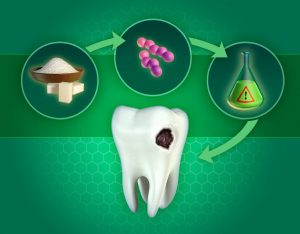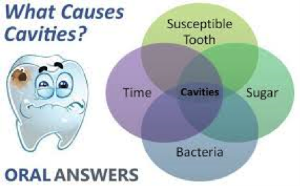
Cavities are the end result of the decay of your teeth. That is the first word, no one ever wants to hear in the dentist's chair. A cavity (literally, keh-VAZH) develops when an enamel decays (hence the term: dih-KAHZ) or becomes broken down (hence: KEZE). A cavity is actually a very small hole in the tooth that can become larger and deeper over the course of time.
Cavities can be caused by many things. Teeth get stained with food and drinks that contain acid; tooth decay also occurs during times of extreme stress; bacteria can be harbored on the teeth and in the gums; cavities can also develop in places that were never meant to hold the tooth in place in the first place; and there are even foods that cause cavities. These are just a few reasons why we have cavities and why they can become severe. A cavity can form in any area of your mouth and some cavities require immediate attention, while others can be repaired at home or by a qualified dentist.
Tooth decay is caused by bacteria in the mouth that feed on the food that the tooth has not fully digested. The process of digestion begins with the release of saliva, which contains nutrients that the body needs in order for its body to digest and break down food.
When bacteria feed on food left in the mouth for too long, the resulting food particles cause the food particles to be deposited on the surface of the tooth. If food remains on the surface of the tooth for an extended period of time, then bacteria begins to build up and this causes decay. If the food stays on the surface for an extended period of time, then the food particles will become lodged between the enamel and the gum tissue. This bacteria begin to grow and spread and causes cavities to appear. Eventually, the bacteria and the food start to eat away at the gums.
Tooth decay doesn't have to be as bad as it sounds. If the cavity fills and heals quickly, then the patient has little to do but wait for the tooth to heal on its own. Most dentists will recommend a filling that does not need to be removed until the cavity is completely healed and there is no visible growth on the tooth. Most people with tooth decay will only need to fill their teeth once, so they don't need to worry about that.
Tooth decay is not the only common dental problem. Gum disease, tooth sensitivity, and gum disease are also common problems that can arise, and each of them may require dentist attention and treatment.

Tooth sensitivity is a condition in which a person with increased tooth sensitivity cannot use their tooth properly because the sensitivity is caused by a foreign substance stuck on the tooth or in the gum area. Gum disease is another problem that occurs when the gums are unhealthy and not functioning properly. Some examples of gum disease can include periodontal disease, periodontitis, gingivitis, and bacterial periodontal infection.
Gum disease usually occurs when plaque builds up on the teeth. There are many different types of plaque and can be classified into plaque and non-plaque. If plaque builds up on your teeth, it can lead to tartar formation or periodontal disease, and your gums will begin to lose their health and become more sensitive.
Gum disease can be prevented with proper dental care and good hygiene practices such as daily brushing and flossing
However, sometimes this process is not enough and the gums begin to recede. This will lead to the formation of tartar and then periodontal disease. This is why it is important for everyone to have proper dental check-ups every six months.
Gum disease can be very painful and it may cause the gums to bleed or the tooth to become cracked. In severe cases of gingivitis, the gums may actually bleed and you may experience swelling of the gums as well. This can cause you to experience pain when eating, talking, or even while sleeping.
Gum disease is not something that should be ignored by anyone and it is important to visit your dentist regularly. Your dentist will be able to provide you with the necessary information and proper treatment that will help prevent future cavities and gingivitis. This is why it is so important to visit your dentist at least twice a year to get your teeth cleaned, examined, and if necessary, treated for possible cavities and gum disease.
Leave a Reply